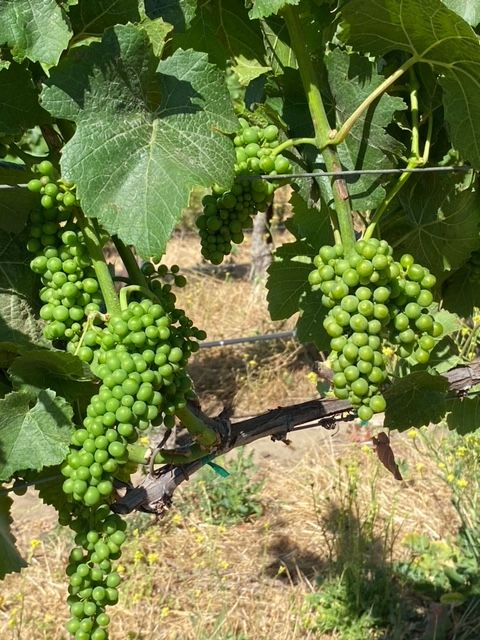It may be the most unlikely California wine success story since the advent of White Zinfandel. Take an obscure grape that doesn’t even get much respect in its French homeland, plant it in California’s sunny Central Coast, thinking that this ‘lip-stinger’ (one of several possible translations of pique-poul, its original French name) may be useful to add some zest to white blends. Find out it doesn’t actually play that well with the others in your white blend. Bottle it on its own as a lean, savoury, 11% alcohol white wine – in other words, a very un-Californian white wine – and discover that this is exactly what the market has been waiting for.
That’s essentially the story of this wine of the week, a refreshing take on a grape that’s mostly known for the near-colourless whites of Picpoul de Pinet. Until recently, that little section of France – a flat, sandy expanse of land around the Étang de Thau in the Languedoc – was the only place in the world where Picpoul shone on its own. And even that took some doing; in the decades preceding the region’s promotion to AOC in 2013, the grape had largely disappeared into vermouth before a concerted marketing effort transformed it into a summer-tourist favourite.
Grahm’s initial interest in Picpoul was, in fact, not as a varietal wine but as an addition to his beloved Cigare Blanc, a sort-of homage to Châteauneuf-du-Pape white wines that he blended from California-grown Grenache Blanc and Roussanne. But Roussanne is a tricky grape to grow anywhere, and that much more so in the sunny and ever-warming climate of California’s Central Coast. The grapes sunburn, the volumes are low, and maintaining acidity is always a struggle. Picpoul, one of the 18 varieties allowed in Châteauneuf-du-Pape wines, was new to California in the 2000s, brought in by Tablas Creek in Paso Robles, whose owners, the Haas family, also import the highly acclaimed wines of Château de Beaucastel into the US. (See more on Tablas Creek in last week’s wine of the week.) Their first vines – a single acre – went into the ground in 2000, and it wasn’t until 2004 that the USDA agreed to recognise it as a wine-grape variety. Grahm, ever curious and hopeful about lesser-known grapes, had the Silva family of Beeswax Vineyard in Arroyo Seco – long his source for Rhône varieties – graft some Roussanne over to Picpoul in the hope that it would make a useful addition to his white blend.
As it turns out, Picpoul loves California. By all accounts, it grows like a weed; if there’s a challenge, it’s in controlling it. ‘We have water, and the soil is more fertile than our European counterparts’, Grahm explains, ‘and so the challenge with Picpoul [here] is getting it to ripen … It requires thinning and dropping, and thinning and dropping, and thinning and dropping …’.
The variety’s quest for domination seems to extend beyond the vineyard and into the bottle as well: as hard as Grahm tried, Picpoul never jelled in the Cigare Blanc blend. Instead, Grahm began giving Picpoul its own spotlight in 2011, and it’s grown only more popular since. (He admits, somewhat ruefully, that it’s more popular than his Cigare Blanc.)
Maybe the most telling proof of Picpoul’s power is that, even after Grahm sold Bonny Doon to WarRoom Cellars in 2020, and whittled down what was once a sprawling selection of zany, unorthodox wines to just a small handful, the Picpoul has remained, a curious outlier from his Cigare family of wines (Blanc, Gris, Orange and Volant (red)). That year the company grafted over 3 acres of vines in the Sweetwater Vineyard in Monterey to Picpoul, and planted another 5 acres in 2021, bolstering the total amount of Picpoul grown in the state to 61 acres (25 ha) according to the USDA stats for 2023.
Grahm still consults on the wine, working with his long-time winemaker Nicole Walsh, and though he’s preternaturally predisposed to experimentation in everything he does, they keep the Picpoul simple: whole-cluster pressed, fermented cool in stainless-steel tanks with neutral yeasts, with just enough time on the lees to take off the sharpest edges but not so much as to dull the acidity. In 2022, a cool year along the Central Coast, they also added a splash of Grenache Blanc; in 2023, the wine will be entirely Picpoul and from Sweetwater, which is slightly warmer than Beeswax.
That 2023 will be hitting shelves soon, but for now, grab the 2022, which is a little richer and more flavourful than most French versions yet still wonderfully zippy. Its green-pear flavour, lemony acidity and appetite-provoking salty savour is exactly the ticket when it’s 95 °F (35 °C) and your brain feels like it’s melting but you really must eat something. With Picpoul, there’s no cooking necessary: it goes with all manner of leafy salads, crunchy raw vegetables and raw seafood; it’s got the acidity to take on your preserved seafood swimming in olive oil or match the tang of a herb-covered round of goat’s cheese. And with its naturally low alcohol, it’s not tiring.
While Bonny Doon’s is not the only varietal Picpoul grown the US (we have tasting notes on three other California versions in our tasting notes database), it remains the most widely available and well priced, from as low as $11.99 in the US, £19.95 in the UK, where it is imported by Enotria & Coe. It’s also widely available in Japan, at prices starting at ¥2,112.
Discover all sorts of Picpoul/Piquepoul wines, from the variety's French homeland to California and McLaren Vale, in our tasting notes database.
















